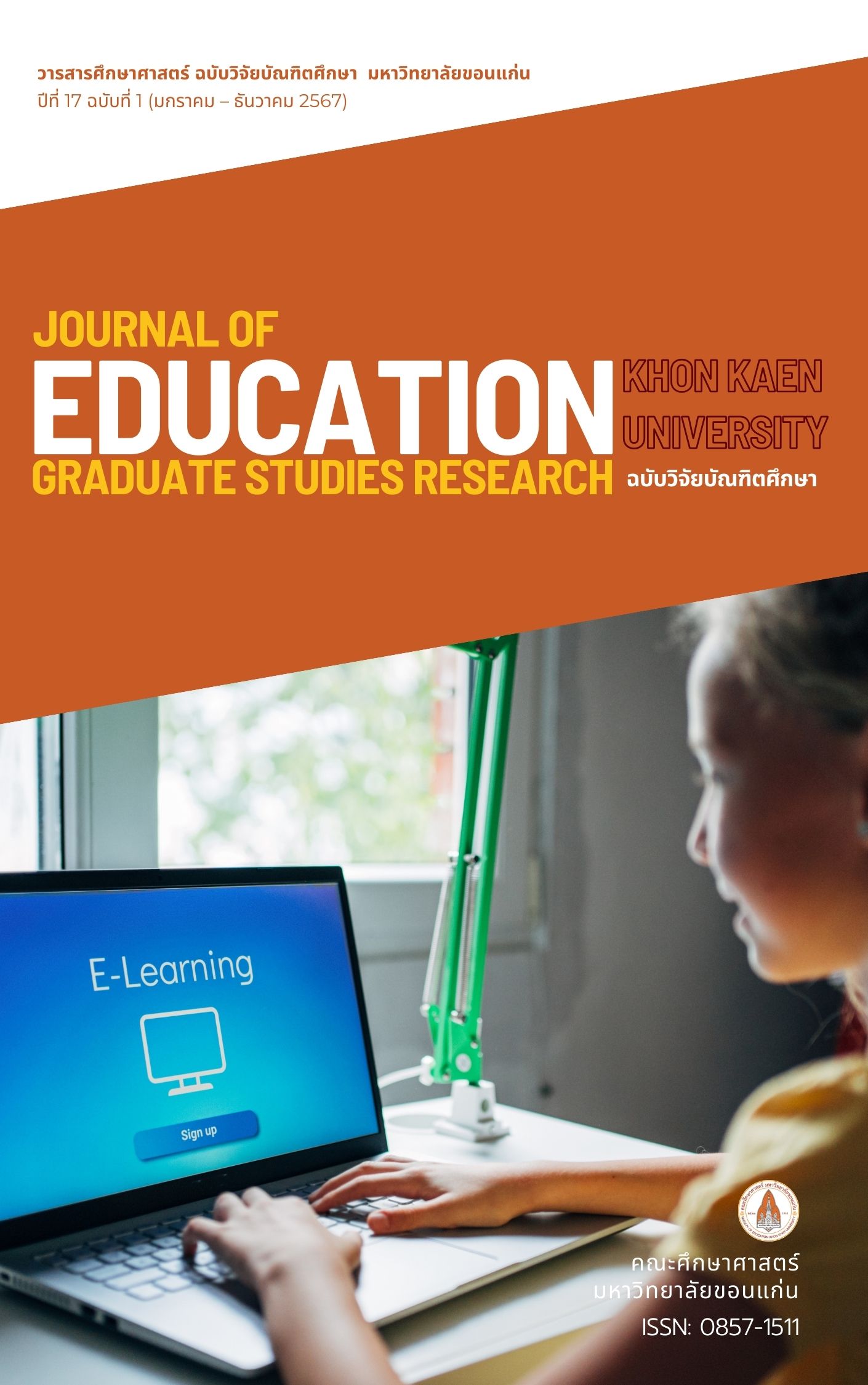The Grounded Theory of the Curriculum Implementation of the Intensive English Course (IEC) of laboratory primary school
Main Article Content
Abstract
This study presented a theoretical conclusion from the curriculum implementation of the laboratory primary school's Intensive English Course (IEC). It is qualitative research to construct a grounded theory. The study used purposive sampling with six key informants. The data was collected by in-depth interview, observation, and note-taking. Then, the data was analyzed with four steps: 1) Open Coding, 2) Axial Coding, 3) Selective Coding, and 4) Developing a theory. The result showed a theoretical conclusion.
(1) The laboratory primary school's Intensive English Course (IEC) performance includes 1.1) Planning: It is collaborative planning between Thai and foreign teachers. 1.2) Doing: Working which support school visions. 1.3) Assessment includes two parts: an assessment of teachers’ performances and students’ assessments. 1.4) Reflection has two parts: the reflection between Thai teachers and foreign teachers and the reflection from teachers to students.
(2) Factors affecting the successful performance were the following: 2.1) Teachers’ role, which worked as a team, self-development, and encouraged students to study. 2.2) Parents who care for students and support the school’s activities. 2.3) Students are eager to learn, and 2.4) School policies that support learning English.
Article Details

This work is licensed under a Creative Commons Attribution-NonCommercial-NoDerivatives 4.0 International License.
References
กระทรวงศึกษาธิการ. (2552). หลักสูตรแกนกลางการศึกษาขั้นพื้นฐาน พุทธศักราช 2551. กรุงเทพ : ชุมนุมสหกรณ์การเกษตรแห่งประเทศไทย
ชาย โพธิสิตา. (2550). ศาสตร์และศิลป์การวิจัยเชิงคุณภาพแห่งการวิจัยเชิงคุณภาพ. พิมพ์ครั้งที่ 3. กรุงเทพมหานคร: บริษัท อมรินทร์พริ้นติ้งพับลิชชิ่ง จำกัด
ธีระเกียรติ เจริญเศรษฐศิลป์. (2559). ปาฐกถาเรื่อง “Education Reform & Entrance 4.0”ข่าวสำนักงานรัฐมนตรี 461/2559. [ออนไลน์], สืบค้นจาก: http://www.moe.go.th/websm/2016/nov/461.html. เมื่อวันที่ 16 พฤษภาคม 2566.
พิชาย รัตนดิลก ณ ภูเก็ต. (2555). บทวิจารณ์หนังสือระเบียบวิธีทฤษฎีฐานราก (Grounded Theory). วารสารพัฒนาสังคม, 14(2), 101-110.
ศักดิ์สิน โรจน์สราญรมย์. (2555). โครงการเพิ่มผลสัมฤทธิ์ทางการเรียน. กรุงเทพมหานคร: สถาบันพัฒนา คุณภาพวิชาการ (พว.).
สำนักงานคณะกรรมการการศึกษาขั้นพื้นฐาน. (2552). ตัวชี้วัดและสาระการเรียนรู้แกนกลางกลุ่มสาระการเรียนรู้ภาษาต่างประเทศ ตามหลักสูตรแกนกลางการศึกษาขั้นพื้นฐานพุทธศักราช 2551. กรุงเทพฯ : ชุมนุมสหกรณ์การเกษตรแห่งประเทศไทย จำกัด.
สุรศักดิ์ วงค์ษา (2564). การวิจัยเชิงคุณภาพด้วยวิธีทฤษฎีฐานราก: แนวความคิด วิธีการและข้อพึงระวัง. วารสารศิลปะศาสตร์ปริทัศน์, 15(1): 117-130.
อารีวรรณ กลั่นกลิ่น และวาสนา อูปป้อ. (2562). ทฤษฎีฐานรากในวิจัยทางการพยาบาล.พยาบาลสาร, 46(ฉบับพิเศษ): 116-127.
Charmaz, K. (2006). Constructing Grounded Theory: A Practical Guide through Qualitative Analysis. London: Sage Publications.
Creswell, J.W. (1998) . Qualitative Inquiry and Research Design: Choosing Among Five Traditions. Thousand Oaks, CA: Sage.
Crystal, D. (1997). English as a global language. Cambridge & New York: Cambridge University Press.
Glaser, B., & Strauss, A. L. (1967). The Discovery of Grounded Theory: Strategies for Qualitative Research. Chicago: Aldine Publishing Company
Strauss, A.L. & Corbin, J. ( 1990 ). Basic of Qualitative Research: Grounded Theory Procedures and Techniques. 2nd Editions. Newbury Park, CA: Sage
Strauss, A.L. & Corbin, J. (1998). Basics of Qualitative Research: Techniques and Procedures for Developing Grounded Theory. California, Sage Publications, Inc.

